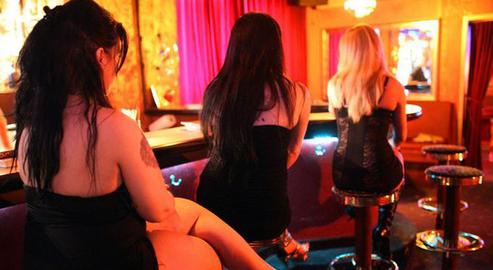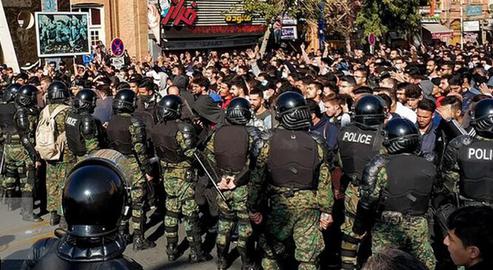Iranian sex workers are often destined for Turkey. Many of them travel to Turkey during the spring and summer for seasonal work, but turn to sex work instead, or in addition to this work. This has resulted in parts of Turkish society viewing Iranian women as sex workers. And with the growth in the number of Iranian asylum seekers arriving in Turkey, the problem has worsened.
With the outbreak of the Covid-19 pandemic, the closing of borders and intensified efforts to control illegal traffic across borders and the cold weather, the sex trafficking market has been in relative decline — or that is how it appears. Local residents of border towns like Van say the decline has boosted the market for prostitution sex in these areas. At the same time, sex workers say their livelihoods are under threat due to the spread of coronavirus, and the dangerous profession has become even more risky.
***
Maryam (not her real name) is Iranian asylum seeker working as a sex worker in a Turkish tourist town. Before the outbreak of the pandemic, her work was relatively lucrative: she could make a modest living. But since the outbreak of coronavirus, imposed quarantines, strict laws restricting social activities and travel bans, along with the general fear of contracting the virus, her work has been increasingly difficult and a shadow has begun hanging over her life and how she can support herself. The situation has become much more difficult for her.
Maryam talked to IranWire about her work before and after coronavirus.”Before the outbreak of coronavirus I made arrangements with clients in clubs and bars in the city, but due to the closure of public places, I no longer have a place to attract customers and I have to look for them in the city, and at times when there is no curfew. In the small, tourist town where I live, my clients were mostly travelers and tourists who came here for the holidays, but in the current situation, I only serve local customers and my work and income have been drastically reduced. I can hardly cover my living expenses. I have problems paying for rent and daily necessities."
The spread of the coronavirus has not only reduced Maryam and her colleagues’s income, but the change in the customer base has meant a change in behavior too. "Before the coronavirus epidemic, with the good income I was earning, I was able to wear brand-name clothes, make myself up beautifully, and enhance my appearance. Even before that, I had the right to choose: I selected men who looked good or were good people. But now there is no choice. Because of the reduction in the number of customers, I have to accept any customer from any class, regardless of other aspects and risks, and even health care. This has led to violence and even beatings in some cases. Several times I had to go to the hospital due to the drunkenness of the client and the blows they inflicted on my body and face. On the other hand, because the Turkish government has cut off asylum insurance, I have to pay all the heavy costs of the treatment myself."
The Turkish government’s decision to cut off insurance for refugees has affected the entire refugee community in the country. Many asylum seekers suffering from various ailments and diseases have had to either give up treatment to the detriment of their health or have to pay for their treatment doing whatever they can to make money.
"Turkey does not support sex workers, and in many cases [authorities] treat us harshly,” she said. "Every day, the scope for a normal life becomes narrower for us, but we have no escape: we have to give up everything to make a living."
In Turkey, sex work is not actually a crime and yet there is no adequate regulation of the profession. In particular, asylum seekers or migrant sex workers are unable to obtain official licenses to carry out this work because they don’t have insurance. Their clients normally don’t bother with enquiring about whether they have been tested for sexually-transmitted diseases, but this is, strictly speaking, required by law. At the same time, the cost of testing is high, so it’s difficult for sex workers to ensure this takes place.
Following the rise of Recep Tayyip Erdoğan’s Justice and Development Party [AK Party] in 2002, new rules and regulations were brought in that, in theory, gave authorities greater control over the sex industry. "Prostitution is allowed as long as you have a license and a health card that shows the results of a recent test for sexually transmitted diseases,” the law reads. However, Article 227 of the Turkish Penal Code [Law No. 5237] places bans and restrictions on sex work, and provides for sentences from between two months and four years in prison for "promoting prostitution.”
Turkey provides a good market for sex workers from neighboring Iran, not least because the country has such a high number the largest number of asylum seekers, and a healthy tourism industry. Some women may come to Turkey solely for seasonal sex work, and others may be asylum seekers and immigrants who have been forced into sex workers by poverty, their rights being hampered because they are not citizens, and lack of employment and insurance.
It follows that Turkey is a good and profitable place for sex trafficking gangs and prostitution rings that violate the human rights of sex workers to operate.
The city of Van, located in north-eastern Turkey, has thousands of sex workers from neighboring countries: from Iran, but also Azerbaijan and Afghanistan. Many of them choose to go to Van to seek sex work and have settled in the city working in the profession. Most of them live and work in groups and usually only get into trouble when they are reported to the police.
An source living in Van, Turkey, told IranWire about the situation there, confirming Maryam’s account: "Even with the pandemic and coronavirus disease, these activities continue and only seasonal workers, who usually travel to Van in the spring and summer, have problems with entry bans and travel expenses. Of course, before the outbreak of the disease, sex workers worked in cafes or discos or sought out customers on the streets or elsewhere in the city. But now, due to the closure of public places, mostly Iranian asylum seekers communicate by phone and coordination with a broker, or the so-called Agha Balasar, or through social networks such as Instagram."
It’s perhaps unsurprising that there are no statistics on the number of Iranian migrant sex workers and asylum seekers in Turkey, especially since they are not officially active. "Currently, the top rank of sex workers in the city of Van are from Azerbaijan, followed by Iranian asylum seekers living in this city,” the source told IranWire.
The source also said Iranian sex workers living in Van are from a wide range of age groups: older, middle-aged, young and sometimes even girls under the legal age of sexual consent, 18, work in the sex trade. Sometimes women from Iran, due to economic problems and costly living, get in touch with the secretaries of the Agha Balasar and communicate with them and after receiving a round trip fee, come to Van and provide sexual services to their clients.
The source also says that Turkish men have a significant tendency to sleep with Iranian women, and that they are willing to pay a high price. "Before the outbreak of coronavirus disease, there were even requests from clients in different cities in Turkey to send sex workers to cities like Izmir or Ankara. They could do so without difficultly and travel and provide sexual services to clients, mostly Turkish men. But at the moment, their activities are limited to the city of Van and the surrounding villages."
Tough restrictions have been place on people’s movement, including curfews, and Turkish forces monitor and reduce inner-city travel. Although this has had an obvious impact on the cross-border trade, in some ways this has been good for the sex trade, at least for those working in Van. Without people moving back and forth as much, they have a sort of monopoly on the sector, and their clientele, unable to defy the curfew, spend their money in Van. Of course, this does not mean the situation is good for them. "There are no exact statistics on sex workers, mostly asylum seekers, who work underground and secretly and out of need,” the source told IranWire. “In many cases, their fate is unknown. They may become ill, face harassment, attempt suicide, or even be killed and they will disappear without being identified."
Istanbul and Other Cities
But if Van is thriving, it’s not the only place for the sex trade.
There are Iranian asylum seekers working as sex workers in tourist cities like Istanbul. Again, the women made their money from their regular haunts — cafes and restaurants. Often they worked as dancers or singers in such establishments, and potential customers spent time with them over an evening. At the end of the night, they would come to an agreement with the owner of the cafe or bar, or with the sex worker’s pimp, and then take them to hotels or other private locations.
But with several lockdowns being imposed on these cities, such establishments have been opened and closed several times. So women have had to go back on the streets, and women of many nationalities can still be seen looking for customers late at night. Sex work has become less obvious again, more secret like it once was.
There is another phenomenon: many women asylum seekers and immigrants often face judgment and criticism because Turkish society, rightly or wrongly, associates them with prostitution. In an interview with IranWire, several of these women described feeling humiliated and insulted. Many of them receive offers from men who ask them to sleep with them out on the streets or in public places, or from taxi drivers who they have asked to take them home. Government officials have been known to approach them, authorities investigating and monitoring people in the sex trade among them.
Of course, it’s not just women who work in the sex industry. There are men, some of who join the trade voluntarily and many more who are forced into it. There are LGBTQI people who sell their bodies. Poverty, erosion of rights, violence: all contribute to an environment where vulnerable people put themselves in even riskier situations.
Related coverage:
Sex Trafficking and the Iranian Women Working in Istanbul Nightclubs
visit the accountability section
In this section of Iran Wire, you can contact the officials and launch your campaign for various problems

























comments